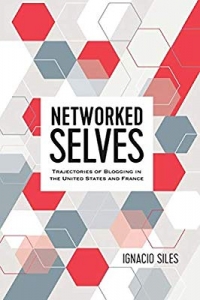In Networked Selves: Trajectories of Blogging in the United States and France, Ignacio Siles studies the evolution of the blog both as a technological platform and a medium of personal expression, focusing particularly on the different conditions that have shaped the creation, adoption and transformation of blogs in the US and France. The book provides powerful insights into the mutually constitutive relationship between media technologies, understandings of publicness and performances of the self, writes Rodrigo Munoz-Gonzalez.
Networked Selves: Trajectories of Blogging in the United States and France. Ignacio Siles. Peter Lang. 2017.
In our media-saturated world, it is easy to forget how certain practices came to be – from sending a tweet to sharing the highlights of our day on Instagram. Yet, it is more difficult to acknowledge how these practices inherit many features from previous ones, from technologies that have lost their limelight and been overshadowed by the focus on social media.
In Networked Selves: Trajectories of Blogging in the United States and France, Ignacio Siles studies the evolution of the blog both as a technological platform and a medium of personal expression. It may seem unusual to examine the history of the development of the blog for it does not receive the same mainstream attention as it did some years ago. Nevertheless, this engaging analysis demonstrates the way in which an interconnection of developers, users and technological features within a specific context shaped many conventions favoured today on social media and the internet at large.
By conducting a transnational analysis that takes into consideration the different conditions of the creation, appropriation and transformation of the blog in the US and France, this book presents an impressive account of the differences and similarities of these dynamics in both countries. Hence, the blog is used as an instance to reflect not only upon issues such as the role of digital technologies in contemporary society, but also to ponder the politico-ideological background in which they rest.
In this sense, Siles critiques mainstream conceptions that regard technology as neutral, as a taken-for-granted ‘architecture’ that affords certain features for people to use. Instead, he argues that more complex processes of co-construction, encompassing aspects from personal convictions to extensive socio-political moments, carve the evolution of a technology, from its production and reception to its consequential transformation. This leads to a crucial observation: technological progress does not happen in a straight line, as though following an ‘automatic’ route; rather, it is the offspring of diverse tensions and negotiations between different actors that, in the end, stabilise how a specific device or platform is understood and utilised.
For example, the book shows how the blog began: during the mid-1990s, as a way to filter the contents of an ever-expanding World Wide Web, the first bloggers started to post hyperlinks on mainly personal websites in order to present a curated version of what they found interesting or compelling, a practice that started in the US and gained traction later on in France with its own local variations. However, as blogging became more popular, these sites became a format and a genre in themselves that evolved to offer spontaneous renditions of everyday life or more refined political commentaries, especially following 9/11 and the 2005 referendum on the European Constitution in France.

Image Credit: (gounder CCO)
Networked Selves masterfully evidences distinct dynamics that influenced the development of the blog and continue to contour how the internet is conceived. Furthermore, it demonstrates that the practice of blogging arranged specific modes of cultivating a sense of the self and, subsequently, a sense of publicness, a particular view that distinguishes between what is private and public. Siles asserts that there is a co-constitutive relationship between the possibilities given by a specific technology, an understanding of publicness and an expression of the self. In other words, the book explores how the blog, through its different phases of evolution, made possible distinct notions of a public sphere where personal identity was presented accordingly in different guises.
This book is therefore a detailed work that traces the ways in which the conception of the self shifted in the act of blogging. With an impressive and rich quantity of interviews with early developers and key users of the blog in both the US and France, this study tracks how self-expression changed amongst bloggers. Self-performance practices – i.e. how users presented themselves on their blogs – are scrutinised not as a mere mirror image of what an individual might want to communicate or as a transparent way of being; rather, they are linked to cultural movements in both countries whose roots have considerable historical rationale.
Siles, therefore, inspects how early bloggers unravelled a bourgeois sensibility which values the inner life of a person, with an emphasis on their daily life. This sensibility was transformed into an ideal of an informed citizen whose duty is to deploy a critical sense of society: blogs became outlets to engage with social issues and current political developments, such as the Iraq War or the 2007 presidential election in France. The analysis contemplates the mode in which blogging and several characteristics of the blog as platform – such as having a comments section – were appropriated by social network sites like Facebook and Twitter, marking its demise as a popular medium and activity in both countries; with this, a fragmented form of self-expression appeared, consisting in a dispersed use of diverse platforms based on a common community of friends or content.
Blogs, through their evolution, attest to the complex processes upon which technology is created and transformed, and how actual human beings interact with it. This book provides an elegant reconstruction of experiences that exhibit a synergy between technical possibilities, individual agency and social contexts. By doing this, the book also employs the blog as a vehicle to contemplate the role of certain ideological values in the understanding of technological innovation. The Silicon Valley imaginaire is explored in order to scrutinise how it has adjusted conceptions of French exceptionalism to ideals of globality in France. Provocatively, Siles tracks the historical evolution of the discourses of French actors in the field of technology, going from a stance characterised by an absolute rejection of the values of the New (Digital) Economy – such as entrepreneurship and economic deregulation – through a more negotiated perspective which underscored the importance of connectivity to recent iterations similar to a neoliberal agenda which conceives society in terms of market relations. Despite having local elements, this work contends, the French experience of the blog retains an ‘American flavour’ that poses questions concerning the hegemony of specific agents in shaping how technological development is comprehended by governments, developers and citizens.
Overall, Networked Selves is a fascinating reflection on the modes by which different technical features, actors, relations and institutions shape how technology is used, understood and (re)constructed. In this exploration of the trajectory of the blog in the US and France, Siles provides powerful insights on the mutually constitutive relationship between media technologies, understandings of publicness and performances of the self; he underlines the challenges of expressing personal identities in a digital environment which is becoming more and more like a regime rather than a place of recognition. Although blogs might have become common tools in the digital age, they were a ‘primordial soup’ from which many practices and tensions of today emerged and continue to unravel.
Please read our comments policy before commenting.
Note: This article gives the views of the author, not the position of EUROPP – European Politics and Policy or the London School of Economics.
_________________________________
Rodrigo Munoz-Gonzalez – LSE
Rodrigo Munoz-Gonzalez is a PhD candidate at the Department of Media and Communications of the London School of Economics and Political Science. His main areas of interest are audience studies, discourse theory, new media and the poetics of communication.


 Find this book:
Find this book: 
